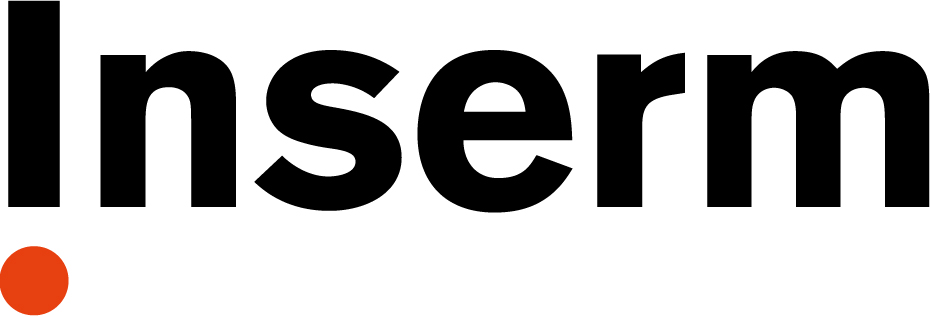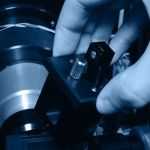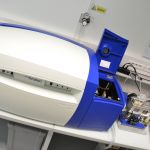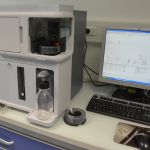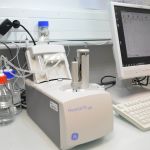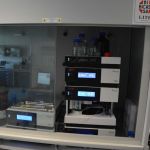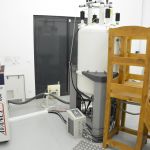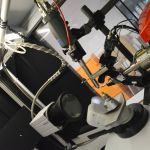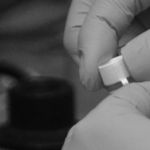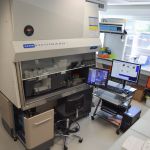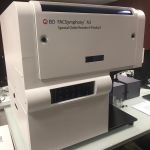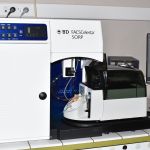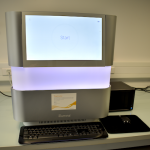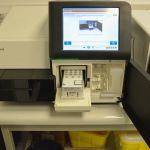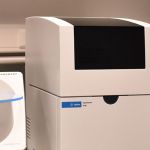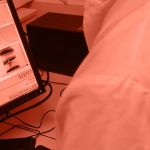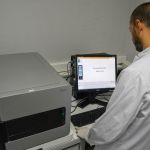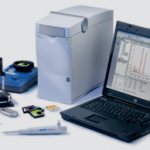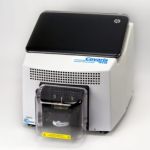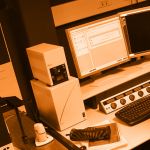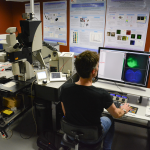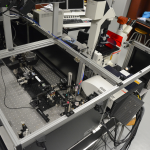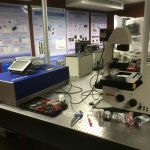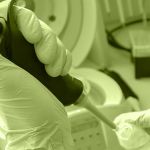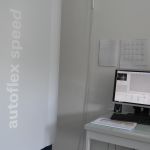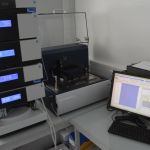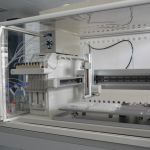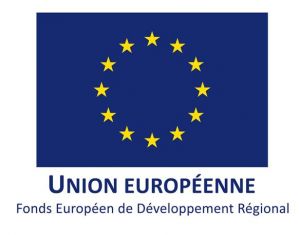The core facility offers :
UMS2008/US40 IBSLor
Ingénierie, Biologie, Santé en Lorraine
Biopôle, Campus Brabois-Santé
9 Avenue de la Forêt de Haye, BP 20199
54505 VANDOEUVRE-LES-NANCY
FRANCE
Didier MAINARD
didier.mainard [at] univ-lorraine.fr
Julie GONNET
julie.gonnet [at] univ-lorraine.fr
The mixed service unit Engineering, Biology, Health in Lorraine (UMS2008/US40 IBSLor) was created on 01 January 2018. It is composed of a CNRS unit (UMR7365 IMoPA) and two INSERM units (U1116 DCAC and U1256 NGERE) belonging to the Pole Biologie Médecine Santé (BMS) of the University of Lorraine. It follows the Féderation de Recherche 3209 Molecular Cellular and Therapeutic Bioengineering (BMCT) (CNRS-UL) (2009-2017) and has 4 own staff and staff made available by the constituent units. The UMS has 3 supervisory bodies: the University of Lorraine and the CNRS which contribute to its operational budget, and the INSERM.
- Provide technological and / or technical support to scientific, academic and industrial projects.
- Ensure the coordinated access of heavy structural equipments grouped in a core facility to users.
Supervising body(ies)
Key numbers of the unit
- 6 Facilities
- 23 Collaborators
- 17 Services
- 38 Equipment
- 10 Trainings
- 71 Publications ACL
2015-2020
Research topics / Know-how
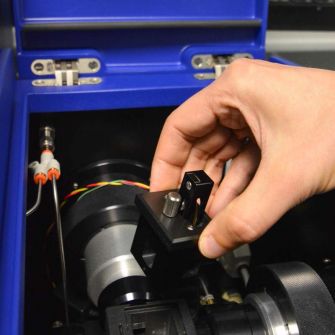
Biophysics & Structural Biology Facility (B2S)
The Biophysics & Structural Biology facility offers a combination of equipment for the in vitro physicochemical characterization of proteins or complexes, and protein-protein or protein-ligand interactions. It provides access to several cutting-edge equipment in biophysics (circular dichroism, microcalorimetry, surface plasmon resonance, light scattering, liquid chromatography, stopped-flow and quench-flow) and in structural biology (NMR equipped with a cryoprobe, and X-ray).
The B2S staff has a real technical and methodological know-how to address different issues ranging from the characterization of protein macrocomplexes to fine enzymatic mechanisms.
The facility operates in two modes: 1) the service mode (turnkey services along with, or not, collaborations) and 2) the provision of devices for expert users after initial training.
Contact(s) :
Sandrine BOSCHI-MULLERsandrine.boschi [at] univ-lorraine.fr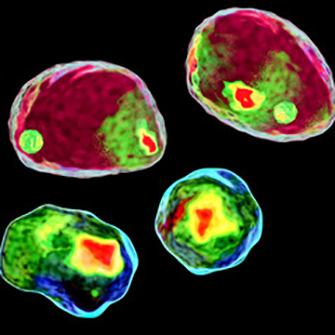
Flow Cytometry Facility
The Flow Cytometry-Cell Biology core facility provides the scientific community with expertise and assistance to support research projects. The expertise at the service of users concerns various fields (analysis of the cell cycle and apoptosis, sorting of rare cells, multiparametric sorting). For this purpose, it offers various services:
- Cellular sorting.
- Flow cytometry analysis.
- Training in acquisition, analysis and interpretation of the results obtained.
- Provision of cytometers after validation of the training.
- Data analysis (Flow-Jo software).
- Advice to users.
The facility has a differential pricing (UMS member teams, academic and industrial).
Contact(s) :
Véronique REGNAULTveronique.regnault [at] inserm.fr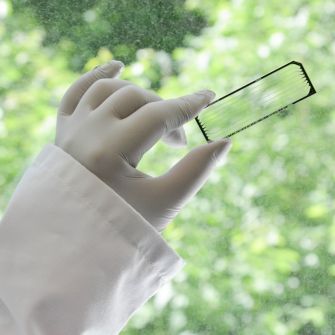
Epitranscriptomics & Sequencing Facility (EpiRNA-Seq)
The Epitranscriptomics & Sequencing core facility has recognized technical and methodological know-how to contribute to various projects in Epitranscriptomics (RiboMethSeq, AlkAniline-Seq) and Transcriptomics (RNA-seq, miRNA-seq) and to address various scientific questions such as dynamics of post-transcriptional modifications in RNAs, gene expression variations, or small RNA profiling (miRNA).
The EpiRNA-Seq core facility operates mainly in collaborative mode (involvement of members of the core facility in the steps of your sequencing project from the conception of the experimental design to the statistical analysis of the data) but the delivery mode (mainly sequencing of libraries prepared by you without involvement of the platform) is also possible under certain conditions. The EpiRNA-Seq core facility has a differential pricing system (members, academics and industrialists).
Contact(s) :
Virginie MARCHANDvirginie.marchand [at] univ-lorraine.fr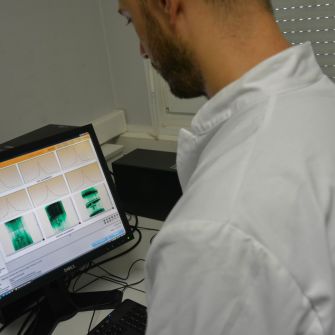
Functional Genomics Facility
The core facility provides to the scientific, academic and industrial community high-tech equipment adapted to the projects of:
- High throughput genotyping on BeadChip Infinium Illumina chips.
- Study of the methylation of the human genome on Infinium Methylation EPIC-Illumina chips.
- Preparation and NGS sequencing of DNA libraries (MiSeq-Illumina sequencer, soon NextSeq 550-Illumina).
- Bioinformatic analysis of omics data.
Contact(s) :
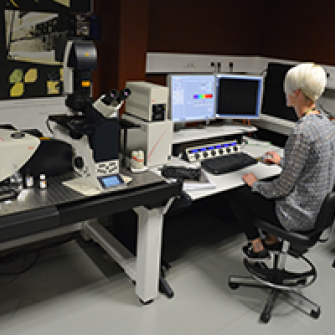
Imaging Facility (PTIBC)
Contact(s) :
Dominique DUMASdominique.dumas [at] univ-lorraine.fr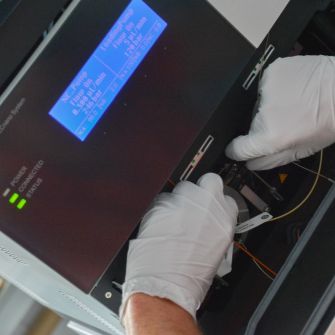
Proteomics Facility
The Proteomics facility assists researchers in the identification and quantification of proteins and in the characterization of their chemical modifications. It specializes in label-free relative quantitative analysis and in the development of affordable analytical methods to promote the democratization of proteomic tools for all types of samples.
It develops sample preparation methods, particularly in the field of extracellular matrix studies. It is open to the whole institutional and industrial community according to specific rates for each case and in compliance with the charter of use.
Contact(s) :
Jean-Baptiste VINCOURTjean-baptiste.vincourt [at] univ-lorraine.fr
Staff

Didier MAINARD Director UL, CHRU
Sandrine BOSCHI-MULLER Core Facility Coordinator UL
Julie GONNET Administrative Manager UL
Equipment
Many equipments are installed on the different facilities of the UMS IBSLor to contribute to the success of your research projects. Some instruments are made available to the scientific community or industrial partners after initial training of users.
To find out how to access and reserve this equipment, do not hesitate to consult the dedicated sheets or connect to the reservation site.
- Biophysics & Structural Biology (B2S)
- Circular Dichroism Spectrometer (CD)
- Biacore X100
- Microcal ITC-200
- SX19 stopped-flow
- Spectrometer RMN 600 Mhz
- X8-proteum
- Flow Cytometry
- MoFlo Astrios
- Symphony A3
- Celesta Sorp
- Epitranscriptomics & Sequencing (EpiRNA-Seq)
- Miseq
- Nanodrop et TapeStation
- Functional Genomics
- i-Scan
- Bioanalyzer 2100
- Sonicator M220
- Imaging (PTIBC)
- Macroscope TCS-SP5
- Confocal SP2
- Microscope TCS-SP8-CARS
- Proteomics
- Autoflex speed IV
- Ultimate 3000/Proteineer FcII
- Ettan TA digester
Services
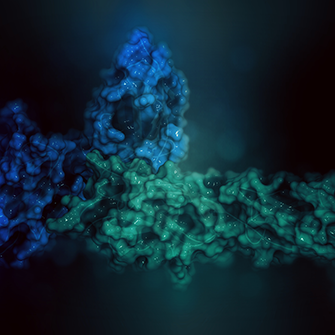
Services offered by the Biophysics & Structural Biology Facility (B2S)
The Biophysics & Structural Biology facility offers the following services:
- Characterization of proteins and complexes in solution: Quality control measurements and functional analysis of protein samples (VP-DSC MicroCal, CD Chirascan-plus Applied Photophysics, DLS Malvern NanoSizer, NMR 600Mhz Bruker Avance III equipped with a TCI cryoprobe).
- Characterization of protein-protein and protein-ligand interactions: Determination of kinetic and thermodynamic parameters of interactions in solution or not, directly or indirectly, by microcalorimetry (VP-iTC MicroCal, iTC200 MicroCal), surface plasmon resonance (Biacore X100 GE Healthcare), fluorescence or NMR approaches.
- Isolation and characterization of various compounds by liquid chromatography (Ultimate 3000 BioRS Thermo Fisher Scientific): Determination of the purity of a sample; identification, separation and monitoring of reactions, determination of compounds in a mixture.
- Structural characterization of proteins and complexes: Determination of the three-dimensional structure of biological macromolecules, their dynamics and their interaction mode by NMR or X-ray diffraction (TTPLAb Tech Mosquito, Diffractometer Bruker X8-Proteum).
- Fast kinetics: Characterization of very fast reactions, crucial step in the fine understanding of enzymatic mechanisms (Stopped-flows Applied Photophysics in absorbance, fluorescence or CD, quench-flow Kin Tek RQF-3).
Contact(s) :
Sandrine BOSCHI-MULLERsandrine.boschi [at] univ-lorraine.fr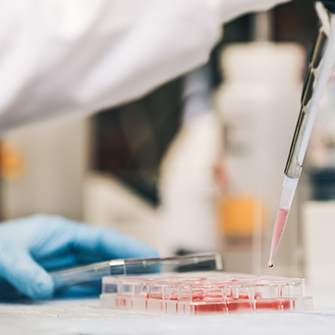
Services offered by the Flow Cytometry Facility
The Flow Cytometry facility offers the following services:
- Cellular tris.
- Flow cytometry analysis.
- Training in acquisition, analysis and interpretation of the results obtained.
- Provision of cytometers after validation of the training.
- Data analysis.
- Advice to users.
Contact(s) :
Véronique REGNAULTveronique.regnault [at] inserm.fr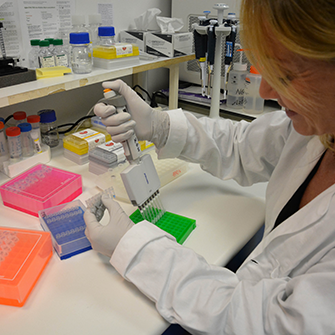
Services offered by the Epitranscriptomics & Sequencing Facility (EpiRNA-Seq)
The Epitranscriptomics & Sequencing facility offers the following services:
- Epitranscriptome / Analyses of RNA modifications: The core facility is specialized in analysis of RNA, and, more specifically in RNA modifications. We are actively developing approaches based on specific treatment of RNA by selected chemical reagents, library preparation from treated RNA, sequencing and associated bioinformatic analysis.
- Transcriptome / RNA-Seq: The core facility offers you a transcriptomics service. The transcriptome is defined as a set of transcripts present in a cell at a given time and under defined conditions. The RNA-seq, using next-generation sequencing, is now a technique of choice proposed by the core facility that allows the global analysis of differential gene expression, alternative splicing and variations of non-coding RNAs (miRNA, lncRNA, etc).
- Sample Preparation / RNA extraction and quality control: The core facility can take care of RNA extraction and enrichment of your samples according to your projects and can perform quality control, in order to obtain optimal results for all your sequencing projects.
- Genomic DNA or exome sequencing: The core facility offers a DNA sequencing service (bacterial or eukaryotic genomic DNA or human exomes with prior enrichment).
Contact(s) :
Virginie MARCHANDvirginie.marchand [at] univ-lorraine.fr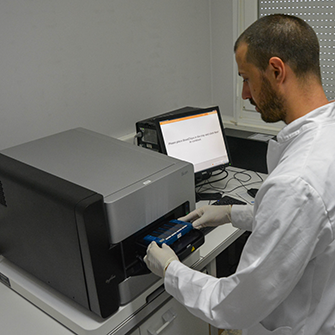
Services offered by the Functional Genomics Facility
The Functional Genomics facility offers the following services:
- Infinium HD genotyping: The Infinium HD assay (Illumina) allows genotyping studies and/or copy number variation (CNV) analyses. The technique allows, depending on the type of chip, the genotyping of SNPs from 3000 to more than 5 million loci in different species.
- High-throughput sequencing (NGS): The platform offers high-throughput DNA sequencing services using Illumina technology. A scientific and technical support for the choice of the library preparation strategy best adapted to the needs of the users is proposed (panels of targeted genes, sequencing of whole genomes (micro-organisms and soon whole genomes of higher organisms).
- Study of human genome methylation on a microarray: Genome-wide analysis of human DNA methylation is performed on the Infinium Methylation EPIC microarray (Illumina). This analysis allows the quantitative measurement of cytosine methylation of more than 850,000 CpG sites using a multiplex genotyping assay on sodium bisulfite-converted genomic DNA (gDNA). The processing scale is 8 samples per microarray.
Contact(s) :
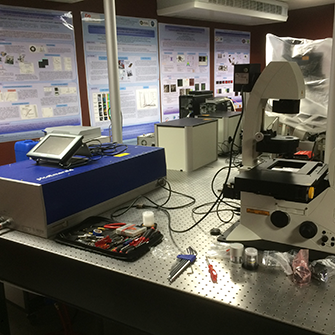
Services offered by the Imaging Facility (PTIBC)
The Imaging facility offers the following services:
- The implementation and management of digital acquisition and signal processing chains for n-dimensional photonic fluorescence microscopy: Conventional optical sectioning microscopy (3D) associated with iterative 3D deconvolution image processing; 3D spectral and confocal laser scanning microscopy; 3D multiphoton laser scanning microscopy; 3D time-resolved fluorescence microscopy; Fluorescence correlation microscopy (FCS); CARS microscopy; Epifluorescence macroscopy; Multiphoton excitation macroscopy; CARS microscope (development).
- Management and rental of devices around real-time imaging: MICA (incubation chamber), CYTONOTE 1w (detection in DHM imaging).
- Assistance in the use of the equipment.
- Participation in the processing and interpretation of images.
- Assistance in the establishment of sample preparation protocols according to the problematic posed.
Contact(s) :
Dominique DUMASdominique.dumas [at] univ-lorraine.fr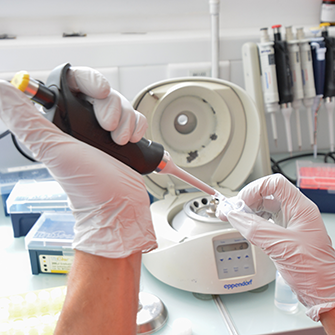
Services offered by the Proteomics Facility
The Proteomics facility offers the following services:
- LC-MALDI : Chemical and enzymatic treatment of samples, being either polyacrylamide gel pieces or water-based solutions (with restrictions regarding buffer contents), for exhaustive identification of protein content ; nanoHPLC fractionation ; MALDI MS and MS/MS analysis ; database interrogation and analytical report.
- Label-free relative quantification by LC-MALDI : Chemical and enzymatic treatment of samples, being either polyacrylamide gel pieces or water-based solutions (with restrictions regarding buffer contents), for exhaustive identification of protein content ; nanoHPLC fractionation ; MALDI MS and MS/MS analysis ; database interrogation and analytical report.
- Protein identification from polyacrylamide gel pieces : Chemical and enzymatic treatment of polyacrylamide gel pieces for identification of major protein content ; MALDI MS and MS/MS analysis ; database interrogation and analytical report.
- Analytical development: For specific needs, the platform develops dedicated protocols based on mono- or bi-dimensional protein electrophoresis, any HPLC method and mass spectrometry.
Contact(s) :
Jean-Baptiste VINCOURTjean-baptiste.vincourt [at] univ-lorraine.fr
Networks / Funding / Partners
- 2019: Integration of the Epitranscriptomics & Sequencing facility (EpiRNA-Seq) into the European COST EPITRAN network.
- 2015: Integration of the Biophysics & Structural Biology facility (B2S) to the ARBRE association (Association of Resources for Biophysical Research in Europe).
Innovations
- - Patents
- 2 Invention statement
- - ERC grant
Publications
- - Nature Communications - 10.1038/s41467-021-22077-4Benoît Bragantini, Christophe Charron, Maxime Bourguet, Arnaud Paul, Decebal Tiotiu, Benjamin Rothé, Hélène Marty, Guillaume Terral, Steve Hessmann, Laurence Decourty, Marie-Eve Chagot, Jean-Marc Strub, Séverine Massenet, Edouard Bertrand, Marc Quinternet, Cosmin Saveanu, Sarah Cianférani, Stéphane Labialle, Xavier Manival, Bruno Charpentier
- - Biochemistry - 10.1021/acs.biochem.1c00052Sana Dermouche, Marie-Eve Chagot, Xavier Manival, Marc Quinternet
- - NAR Cancer - 10.1093/narcan/zcaa036Virginie Marcel, Janice Kielbassa, Virginie Marchand, Kundhavai S Natchiar, Hermes Paraqindes, Flora Nguyen Van Long, Lilia Ayadi, Valérie Bourguignon-Igel, Piero Lo Monaco, Déborah Monchiet, Véronique Scott, Laurie Tonon, Susan E Bray, Alexandra Diot, Lee B Jordan, Alastair M Thompson, Jean-Christophe Bourdon, Thierry Dubois, Fabrice André, Frédéric Catez, Alain Puisieux, Yuri Motorin, Bruno P Klaholz, Alain Viari, Jean-Jacques Diaz
- - Nucleic Acids Research - 10.1093/nar/gkaa769Virginie Marchand, Florian Pichot, Paul Neybecker, Lilia Ayadi, Valérie Bourguignon-Igel, Ludivine Wacheul, Denis Lafontaine, Astrid Pinzano, Mark Helm, Yuri Motorin
- - Journal of Proteomics - 10.1016/j.jprot.2020.103718Dafné Wilhelm, Hervé Kempf, Arnaud Bianchi, Jean-Baptiste Vincourt
- - ACS Catalysis - 10.1021/acscatal.9b04471Alexandre Kriznik, Marouane Libiad, Hélène Le Cordier, Samia Boukhenouna, Michel Toledano, Sophie Rahuel-Clermont
- - Biomaterials - 10.1016/j.biomaterials.2019.03.010Maude Gluais, Johann Clouet, Marion Fusellier, Cyrille Decante, Constantin Moraru, Maeva Dutilleul, Joëlle Véziers, Julie Lesoeur, Dominique Dumas, Jérôme Abadie, Antoine Hamel, Eric Bord, Sing Yian Chew, Jérôme Guicheux, Catherine Le Visage
- - Nature - 10.1038/s41586-018-0841-4Mathieu Ringeard, Virginie Marchand, Etienne Decroly, Yuri Motorin, Yamina Bennasser
- - International Journal of Cardiology - 10.1016/j.ijcard.2018.07.130Batric Popovic, Faiez Zannad, Huguette Louis, Isabelle Clerc-Urmès, Cécile Lakomy, Sébastien Gibot, Cécile Denis, Patrick Lacolley, Véronique Regnault
- - Nature Communications - 10.1038/s41467-017-02306-5Jean-Louis Guéant, Céline Chery, Abderrahim Oussalah, Javad Nadaf, David Coelho, Thomas Josse, Justine Flayac, Aurélie Robert, Isabelle Koscinski, Isabelle Gastin, Pierre Filhine-Tresarrieu, Mihaela Pupavac, Alison Brebner, David Watkins, Tomi Pastinen, Alexandre Montpetit, Fadi Hariri, David Tregouet, Benjamin A. Raby, Wendy K. Chung, Pierre-Emmanuel Morange, D Sean Froese, Matthias Baumgartner, Jean-François Benoist, Can Ficicioglu...





